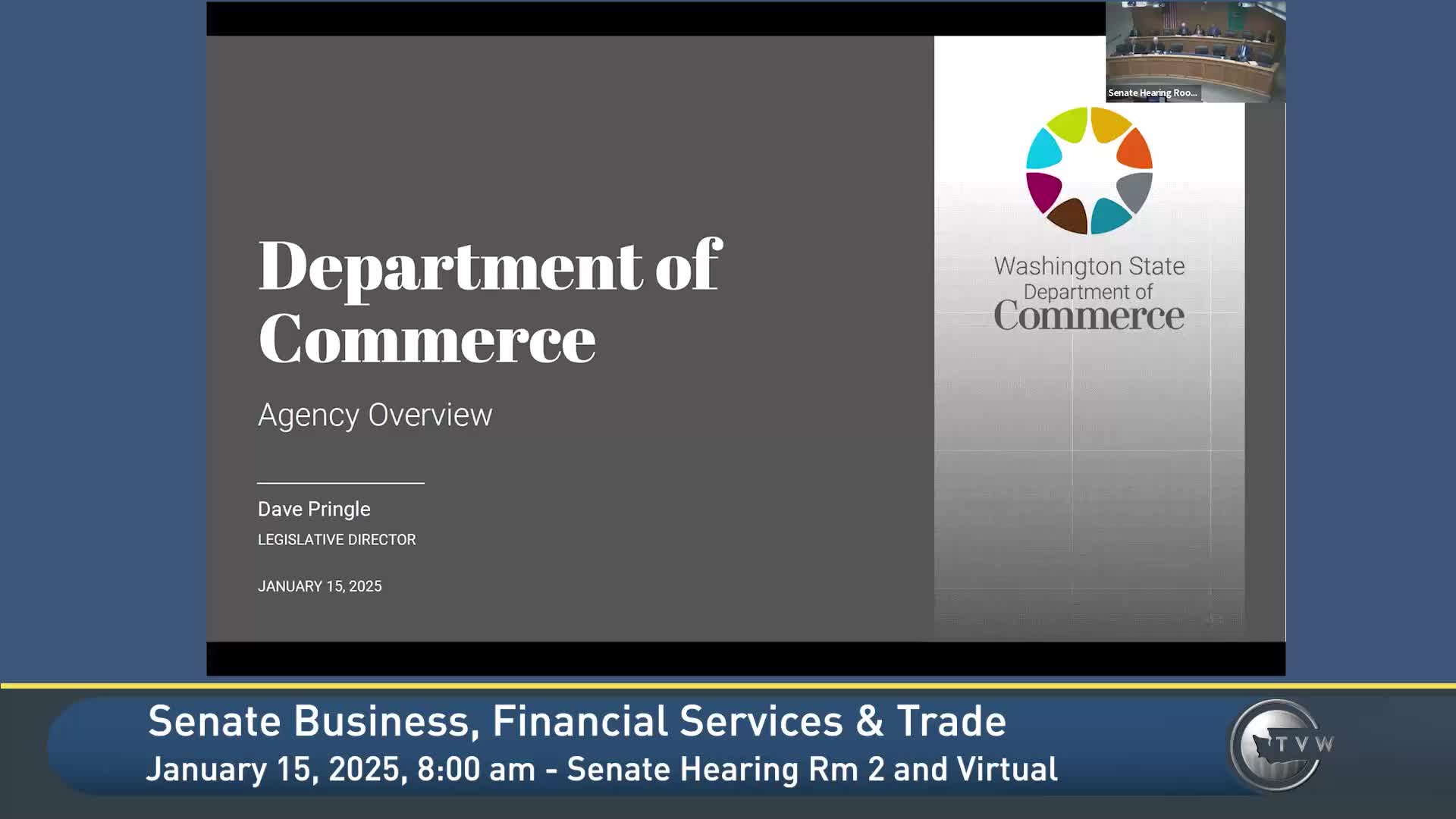Commerce presents broad plan on housing, clean energy and broadband funding
Get AI-powered insights, summaries, and transcripts
Subscribe
Summary
The Department of Commerce briefed the committee on a wide portfolio including housing production and preservation, clean‑energy funding and strategy, broadband grants and digital equity, community capital projects, and programs addressing homelessness and community safety.
David Pringle, legislative director for the Washington State Department of Commerce, told the Senate Businesses, Financial Services and Trade Committee that Commerce’s mission is to "strengthen communities" through housing, infrastructure, clean energy, economic development and supporting local services. The department gave an overview of program areas, budget trends and priority requests for the 2025 session.
Pringle said Commerce now administers more than a hundred programs and that capital funding has driven growth in the agency’s responsibilities. "Over the past 10 years or so, we've seen our budget increase quite a bit, particularly ... capital budget dollars," he said, and added that the agency’s operating budget has grown to support homeless shelters, affordable housing operations and local technical assistance.
On housing, Commerce cited a need for more than 1.1 million new homes in Washington by 2040 and stressed the importance of affordable units for households below area median income. The department noted the state’s long‑running investment in the State Housing Trust Fund and said that since 1986 the state has invested for nearly 80,000 affordable units; recent funding since 2020 has supported roughly 20,000 units and the department expects another roughly 14,000 units with current commitments.
Pringle described multiple housing programs: rent assistance and shelter diversion for homelessness, mobile‑home relocation and tenant support when parks close, an office focused on homeless youth, a homeownership program that partners with organizations such as Habitat for Humanity, and multifamily capital funding that is coordinated with the Washington State Housing Finance Commission and federal tax‑credit allocations.
On energy and climate, Commerce described the state energy strategy and work to reduce greenhouse gas emissions, including grants for grid resilience, solar, weatherization and electric‑vehicle infrastructure. Pringle highlighted that the agency consolidated an application process to distribute roughly $37 million in clean‑energy and efficiency grants in the prior biennium and noted separate tribal clean‑energy allocations.
Pringle said broadband remains a priority. The Washington State Broadband Office is participating in the federal NTIA broadband program application process; the NTIA funding opportunity referenced in testimony totals about $1.2 billion. Commerce asked the committee to consider state matching resources to help smaller communities and tribes access federal broadband funds and emphasized a parallel digital‑equity effort that covers devices, training and community outreach.
Community capital and infrastructure work was also described. Pringle outlined the Community Economic Revitalization Board (CERB), the Public Works Board and a cross‑agency infrastructure coordination effort (the "sync team") that seeks to align state projects and reduce repeated excavation through a "dig‑once" approach.
Pringle summarized agency staffing and structure: Commerce reported adding roughly 440 full‑time equivalent positions since 2021 and maintains regional offices in Olympia, Seattle, Spokane and the Tri‑Cities. He described implementation steps for appropriations — from legislative appropriation to contracting, then program delivery and reporting — and noted duties under the HEAL (Health, Environmental and Environmental and Legal?) framework to consider environmental justice and equity in program delivery.
Committee members asked detailed questions about mobile‑home park relocation, the state’s role in situations where a court awards property but the mortgage remains in another party’s name, and community safety and violence‑prevention programs administered or funded by Commerce. Pringle said Commerce administers relocation assistance when a manufactured‑home park closes and has programs to work with tenants on purchase/co‑operative opportunities, but acknowledged practical limits where homes cannot be moved.
He also described Community Services Division programs that support poverty reduction, free tax preparation, legal aid contracts for immigrant communities, and the Office of Firearm Safety and Violence Prevention and the Office of Crime Victims Advocacy, which provide prevention research and fund community‑based services.
No committee votes were taken in this overview session. Pringle asked for legislative support where state matching resources will help communities leverage federal funds and said Commerce will continue to provide briefings and implement statutory obligations assigned by the legislature.
